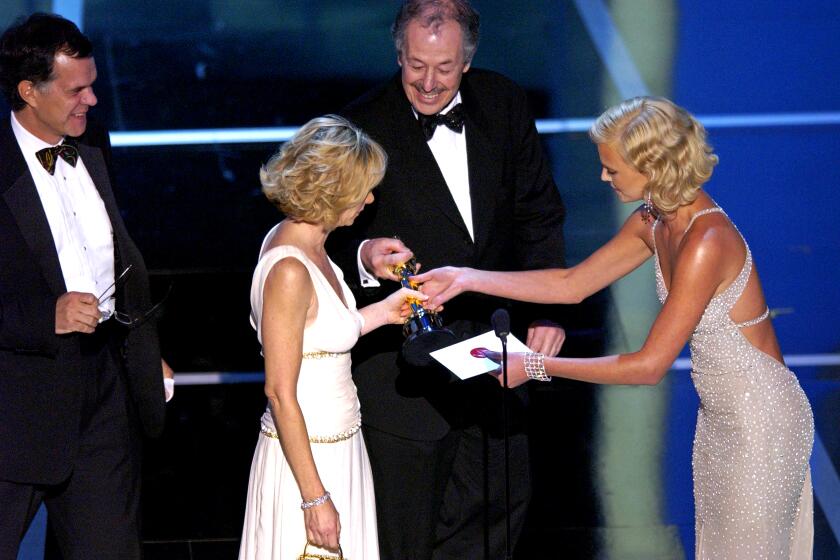Oscars rewind -- 2004: The reign of the fiery documentarian continues

Documentary films and their directors are not generally known for their star wattage. Most Academy Award-winning directors rise up with a unique take on their subject, and just as quickly step away from the limelight. But something shifted in the early 2000s: Michael Moore won in 2003 for “Bowling for Columbine” (and accepted the award with a firebrand speech) — and in 2004, it happened again as veteran innovator Errol Morris earned his first Oscar nomination and first win, for “The Fog of War.”
Morris, who’d been making documentaries since 1978, changed what was possible in the medium. His “The Thin Blue Line” (1988) popularized the “re-creation” of fact-based scenes, and ended up assisting in getting his jailed subject freed from prison. (And, because no good deed goes unpunished, the freed former prisoner ended up suing Morris for the rights to his story.) So when Morris stood on the stage of the Kodak Theatre on Feb. 29, 2004, and noted, “I’d like to thank the academy for finally recognizing my films,” well, it was hard to begrudge him a little ego chow.
He accepted the award from presenters Alec Baldwin and Naomi Watts, then went on to thank the subject of his film: Robert McNamara, who’d served as the U.S. secretary of defense during the Vietnam War. “If he hadn’t done it, there would have been no film,” Morris added. “Forty years ago this country went down a rabbit hole in Vietnam and millions died. I fear we’re going down a rabbit hole again [with the War on Terror]. And if people can stop and think and reflect on some of the ideas and issues in this movie, perhaps I’ve done some damn good here.”
Third time was the charm for director Denys Arcand, who took the prize after two previous films had been nominated.
Recognition of Morris proved that mass interest in documentaries had reached new levels; during the 2003-04 Oscar season, all five nominees were given extended theatrical runs for the first time. The competition was significant, with three films dealing with politics and war, and two investigating very personal family connections.
“Balseros,” which focused on the Cubans who escaped their country in 1994 and sailed for Florida in everything from homemade rafts to a hijacked ferry. It was the first and only nomination for writer-director Carles Bosch and co-director Josep Maria Domènech.
“My Architect: A Son’s Journey,” told the story of the late American architect Louis Kahn — and was directed by his son, Nathaniel Kahn. The story focused on not just Louis’ career but the three families he created — none of whom knew about one another. It was his son’s first nomination, and he shared it with first-time nominee Susan Rose Behr. Both would be nominated again in 2007 for the short, “Two Hands: The Leon Fleisher Story.”
“The Weather Underground” showcased the beginning and end of the radical organization Weather Underground, which took on everything from breaking Timothy Leary out of prison in 1970 to bombing government buildings in the early years of that decade. It provided the first and only nominations for co-directors Sam Green and Bill Siegel.
And while “Fog of War” took home the ultimate prize, the last film in consideration, “Capturing the Friedmans,” seems to have been the one with the longest tail. Andrew Jarecki (co-founder of Moviefone) hit things out of the ballpark with his first effort, which focused on the investigation of Arnold and Jesse Friedman (father and son) in the 1980s for child molestation. Arnold died in jail, but Jesse — who was 19 when he confessed — spent 13 years in jail and continues to fight to clear his name. This film earned producer-director Jarecki and producer Marc Smerling their only nomination to date.
More to Read
From the Oscars to the Emmys.
Get the Envelope newsletter for exclusive awards season coverage, behind-the-scenes stories from the Envelope podcast and columnist Glenn Whipp’s must-read analysis.
You may occasionally receive promotional content from the Los Angeles Times.









